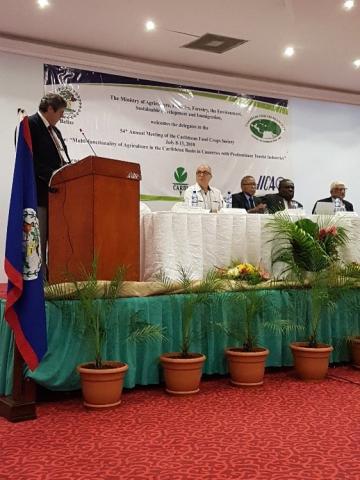

The Caribbean Food Crop Society through the collaboration of the Ministry of Agriculture hosted the 54th Annual Meeting from July 8th to 13th, 2018, at the Ramada Hotel, Belize City. This year’s theme focused on Multi-functionality of agriculture in the Caribbean basin in countries with predominant tourist industries. The event consisted of keynote speakers from various international and regional organizations, poster display, technical presentations and a farmer’s forum.
The Coordinator of the Projects Unit of the Inter-American Institute for Cooperation on Agriculture (IICA), Gabriel Rodriguez, during his speech, mentioned that for every dollar that tourists spend in the Caribbean, local economies devote between USD 0.60 and 0.80 to import the food and beverages that the sector consumes, which is a situation that makes the strengthening of linkages between tourism and agriculture and an increase in the capacity of domestic production a necessity.
Rodriguez pointed out that “We are faced with a great opportunity to transform agriculture into a local generator of food for the more than 30 million tourists who visit the Caribbean each year, in a sector that is growing at a rate of 4.3% annually”.
Other successful Caribbean ventures, supported by IICA in the Caribbean, capture experiences in culinary tourism, health and well-being and community tourism.
However, in the bid to increase its agricultural development, the Caribbean also faces daunting obstacles. For example, 48% of the arable land has high or very high levels of soil degradation; high levels of poverty in rural areas are driving migration; and the region is vulnerable to extreme climate events, such as hurricanes.
Rodriguez commented that “In order for Caribbean agriculture to better exploit potential linkages with tourism, it is crucial that we improve the availability of food, ensure effective management of the chain; equip the sector with improved infrastructure and technology for production, storage, distribution and processing, while abiding by international and local standards”.
More information:











